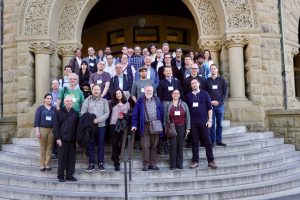Natural language processing is one of the most challenging and important areas in Artificial Intelligence and Machine Learning. At Sony CSL Paris, we have pioneered new language technologies based on “constructional” language processing for achieving deep semantic analyses and bidirectional grammars for language production and comprehension.
Job description
We are currently looking for a software engineer / computational linguist who will develop an industrial-strength implementation of our open-source software platform “Fluid Construction Grammar”. Your responsibilities include:
– Implementation of an industrial-strength grammar architecture based on Fluid Construction Grammar (www.fcg-net.org);
– Interface with statistical NLP modules;
– Monitor data acquisition and curation; design control, implementation and improvements;
– Propose and develop new prototypes and applications
– Manage communication and cooperate on legal issues concerning applications
Qualifications:
– Master or Doctoral Degree in Computer Science, Computational Linguistics, Artificial Intelligence; or equivalent practical experience
– Minimum of 5 years of experience in developing projects, preferably in NLP research or related domains
– Independent worker with leadership abilities and the ability to cooperate in a constantly evolving international team
– Multilingual speaker
– Experience in programming languages and in particular symbolic programming
Our offer:
You will earn a competitive salary and get to work in the heart of Paris (5th arrondissement). Extra benefits include meal vouchers, 50% reimbursement of your public transport subscription, and an attractive health insurance contract.
About Sony CSL Paris
Sony CSL Paris was founded in 1996 and is a small but booming research cell, focusing on the following areas: personal music experience, developmental cognitive robots, self-organizing communication systems, and sustainable environment simulation.
Sony Computer Science Laboratory is engaged in several European projects such as FLOW MACHINES, PRAISE, IDGF, LRN2CRE8 and other projects.
Research in Personal Music Experience focuses on the future of musical listening by building prototypes of interactive devices and ethnographic experiments to see what people find exciting in music and how new ways of listening integrate in their lives.
Research in Language is dedicated to constructional language processing and self-organising communication systems. Constructional language processing is a novel approach to the production and comprehension of language that based on rich semantics and a powerful data structure called “constructions”. Research in self-organizing communication systems investigates through computational simulations and mathematical models how a group of autonomous agents/robots could be able to invent and negotiate a communication system similar to human natural languages.
How to build a sustainable society has recently become a major issue as natural resources get depleted and climate change is of great concern. Sony CSL Paris has launched a number of projects to raise awareness about the issues through volunteer computing and participatory food production.
Sony CSL Paris plays a leading role in the areas it has chosen to be active in. It produces a steady stream of papers in the most prestigious journals and conferences. The lab is viewed as highly innovative and plays a leading role in European IT research.
Contact
Candidates should send their cv and motivation letter to Dr Remi van Trijp (remi@csl.sony.fr) before 28 June 2017. The contract starts 1 september 2017.
